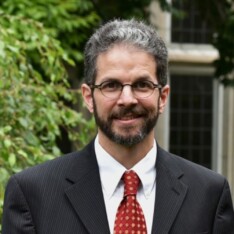A recent poll by the US Chamber of Commerce found that “91 percent of small businesses believe that they should give back to their local communities.” Just what they have unjustly taken from their communities that now needs to be returned is unclear. Businessmen should know better than most all the good that business does. So, too, should religious leaders, precisely because they are expected to have a special concern for the poor and exploited.
Unfortunately, the assertion that profitable businesses are somehow detrimental to the common good was on display recently in a now infamous cartoon of a bicycle-riding Pope Francis published by the Vatican’s Dicastery for Integral Human Development (IHD). Good intentions are no substitute for sound economic thinking, especially because muddled economic thinking traps people in poverty rather than lifting them out.
For some necessary context here, a dicastery is a Vatican department, part of the bureaucratic apparatus of the Holy See (i.e., “the Vatican”). The Vatican is heavily dependent on the current personalities who occupy these offices, and personnel is dependent on popes who, as sovereigns, can recast and repopulate departments as they like. The current IHD dicastery was created by Pope Francis in 2016 by joining several pontifical councils together, each of which could trace its immediate roots to either John Paul II, Paul VI, or Pius X.
The IHD dicastery states that its mission is to promote “the fight against poverty” by working “with national and international institutions for the pursuit of integral human development.” The dicastery “promotes and defends equitable economic models and sober lifestyles, especially by promoting initiatives against the economic and social exploitation of poor countries, asymmetrical commercial relations, financial speculation and development models that create exclusion.”
There is no space in this brief essay to dissect all that this means or to unpack loaded terms like “asymmetrical commercial relations” and “equitable economic models.” Our modest task here is to address the dangerous misperception that profit and the common good are in zero-sum opposition to one another.
Thankfully, the dicastery, though an arm of the Holy See, doesn’t represent the only Catholic understanding of the role and purpose of business in society. Indeed, in the illustration IHD actually contradicts the Church’s Compendium for Catholic Social Doctrine, which was originally published by IHD’s predecessor, the Pontifical Council for Justice and Peace. The Compendium is the official, go-to source for Catholics on moral questions related to economic, political, and social life.
The Catholic Church has long condemned unjust business practices and exploitation, and rightly so. The “legitimate pursuit of profit should be in harmony with the irrenounceable protection” of human dignity. The very phrase, “legitimate pursuit of profit,” implies there is both legitimate and illegitimate pursuit of profit. Legitimacy comes from operating within the rule of law, respecting private property, and conforming to the institutions of justice. Above all, it demands we take account of the dignity of the people whom businesses serve, including their own employees. Moreover, we ought to be thinking about ways to exist in solidarity with others in ever widening circles of exchange. Businesses just by being businesses already promote the common good “through the production of useful goods and services,” and in so doing, “businesses create wealth for all society.”
None of these moral considerations force us to conclude that earning a profit invariably harms the common good. As John Paul II wrote in Centesimus Annus, substantial portions of which now form the Compendium’s sections on business, profit, and economics, “when a firm makes a profit, this means that productive factors have been properly employed.” Profit is a metric, as any good economist knows, that tells us a business is functioning well.
The IHD dicastery, in ignoring John Paul’s wisdom on this, is promoting the kind of economic ignorance that harms the people it wants to help. What it should be doing instead is pointing out that businesses have a moral purpose to play in society and can contribute to the common good. It is a grave mistake to ignore the more robust and intricate Catholic teaching in favor of a simplistic condemnation of profit (and, therefore, of business). By equating profit-making, as such, with evidence of greed and immorality, IHD perpetuates the harmful zero-sum mentality of mercantilism and socialism.
Christian ethics demands that Christians be attentive to the needs of the poor. But how we do that entails the application of virtues like prudence and temperance when it comes to regulation and government intervention in the pursuit of justice. As Samuel Gregg puts in For God and Profit, “Between these polarities of no regulation and endless regulation . . . there is considerable room for Christians to debate among themselves and with non-Christians the scope, character, and fairness of varying forms of economic regulation.”
Arbitrary definitions of “excessive” profit lead to the kind of bureaucratic regulation and government favoritism that retards economic development and encourages corruption and government favoritism instead. “The zero-sum assumption,” Fr. Robert Sirico argues, “prevents people from ever asking whether the solution to poverty might be to grow the pie even more.” In the end, this hurts rather than helps the poor, particularly in the developing world where it discourages entrepreneurs from starting businesses in the first place.
By contrast, a free economy undergirded by the institutions of justice and the rule of law makes entrepreneurship and successful business possible. By relying on the price system and the signals of profit and loss to make the best use of our resources, the free economy compels us to think of others and what we might do for them. It is really government favoritism and cronyism, not the free economy, that produces the long-term, outsized profits decried by Catholic social justice warriors. Adam Smith noted the value of self-interest unencumbered by government planning 250 years ago: “By pursuing his own interest,” Smith wrote of the businessman, “he frequently promotes that of the society more effectually than when he really intends to promote it.”
The opposite of profit is not the common good, it is loss. Loss occurs when a company spends more than it brings in. Profit and loss are important signals, because each tells us about the relative health of the company in question and whether the people running it are making good or bad decisions. Profit signals efficiency and the fulfillment of customers’ needs.
And for the entrepreneur who understands his creative labors as a vocation, profit is best seen not as something he pursues but rather as the happy by-product of his creative excellence. Profit is a metric for economists and a signal to investors. But, most importantly, it confirms to the entrepreneur that he is fulfilling what ought to be the clear mission of the Vatican’s Dicastery for Integral Human Development: enhancing the dignity of the human person through need fulfillment and economic growth.






































